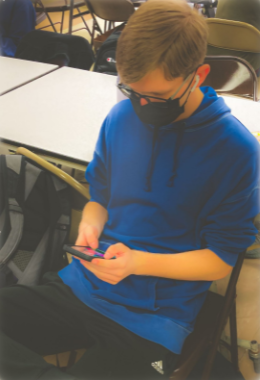The end of procrastination at Solon High School

Dominic Carlozzi on his phone at senior commons.
December 1, 2021
Procrastination is a problem that many students face. According to Robert Rivera, teachers start to notice an increase in the amount of missing and late work from their students as the school year continues. Procrastinating on assignments is also a leading cause of more stress. It is difficult for students to keep up with current work when past work continues to pile on.
Dominic Carlozzi, a senior at Solon High School (SHS), talked about his struggle with procrastination.
“I take CCP classes – college credit plus – my sociology class is due Saturdays at midnight. I am at 11 p.m., starting my assignment. Then the quality of my work goes way down, but if the assignment gets done – in my mind – that’s what matters.”
He believes stress and unhealthy lifestyles are big contributing factors linked to procrastination.
“It causes a lot of unnecessary stress.” said Carlozzi, “I mean I’ve seen all-nighters, I’ve seen unhealthy energy drink usage just because people need to stay up late to finish working on their school work.”
Jennifer Buemi, an English teacher at Solon High School (SHS), shared her thoughts on this issue from a professional perspective.
“Procrastination is rampant throughout high school students,” Buemi said. “We have constant deadlines and students struggle with meeting the deadlines. I think it’s because they are balancing so much in terms of taking a lot of classes, having a work schedule and trying to find time for recreation.”
Buemi shared the tips and tricks she uses herself.
“Surround yourself with motivated people,” Buemi said. “If you surround yourself with motivated people you will see that they are completing homework and then you will be inspired to complete homework as well. I think that is key.”
She feels surrounding yourself with less motivated people will have an opposite effect – she believes if you are around those unmotivated people, you will not want to do your work. She surrounded herself with highly motivated people when she went to high school and college to keep up with her work.
“Keep yourself organized using your phone,” Buemi said. “On your phone, you have a calendar, and I will type into my phone all of my deadlines, so then I know if I need to turn in something to Ms. Short or something to one of my bosses, then it’ll show up on my phone that I have a deadline, and then I will meet that requirement.”
Buemi rewards herself for getting work done quickly and on time. She encourages others to start doing the same.
“I’ll say, ‘ok, if I meet this deadline,’ a research paper or whatever it is, ‘then I’m gonna go buy myself a chai tea latte at Starbucks’ and then that motivates me because I’m like, ‘well I want that treat’ and so then I will meet all of my deadlines,” Buemi said.
SHS senior, Jad Khalid talks about the procrastination he notices among his classmates.
“I feel like it really depends on the kind of person you are,” Khalid said. “Some people are pretty good at what they do, and they don’t procrastinate as much. I believe that I have some procrastination… I think that everyone has some of it, but there’s more in others than some.”
Khalid feels procrastination happens due to the workload many students have. Students have school, tests, homework and projects, but they also have work, sports and family before any recreation time.
“It all connects,” said Khalid. “The stress, the work. There’s only so much time in the day, so you really have to stay on top of things.”
His best advice was to think of the free time you’ll have after getting your work done.
“I just think of my time after, like, ‘If I don’t do it now, how long is it gonna take me to do it later?’” said Khalid. “And ‘If I do it now, what’s the outcome for me later on?’”
He explained how he ended up without school work for days in his English class because he completed a project on the first day it was assigned.
“If you get stuff done, you could end up having more relaxing time or chill time.”
SHS history teacher, Robert Rivera, noted the prevalence of procrastination in his students.
“I think it’s pretty prevalent, unfortunately,” Rivera said. “I don’t have any data to back this up, but I think it’s a mix of distractions, which is technology usually, and I also think it’s about habits. I think it’s a habit you pick up early – that you procrastinate – and then it’s a hard one to break.”
Rivera shared his personal secrets for beating procrastination. He uses the reminders app on his phone to keep all of his deadlines in order.
“I set reminders with time and date deadlines,” Rivera said. “When those come up, I have to do those. So, I think setting reminders for yourself, giving yourself deadlines, but that requires you to look at your calendar for the week ahead, which is something I try to convince my students to do. Look at the week ahead, make a priority list, and then make little deadlines for yourself.”
